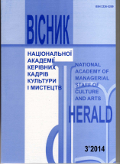ПОЛІТИЧНА КУЛЬТУРА РАДЯНСЬКОЇ ВЛАДИ В ДЗЕРКАЛІ "НОМЕНКЛАТУРНОЇ "КАМАСУТРИ"…" С.Д. БЕЗКЛУБЕНКА
DOI:
https://doi.org/10.32461/2226-3209.3.2014.138104Ключові слова:
С.Д. Безклубенко, Л.М. Кравчук, В.В. Щербицький, політична культура, номенклатура, історична пам’ятьАнотація
Стаття присвячена мемуарам колишнього міністра культури УРСР С.Д. Безклубенка, в яких, зокрема, йдеться про політичну культуру радянської номенклатури. Здійснено аналіз поглядів автора на професійні, інтелектуальні, моральні якості радянських політиків, особливості перебігу боротьби між ними за владу, закономірності розвитку номенклатурної кар’єри. Для всіх, хто цікавиться історією політичної культури в Україні.##submission.downloads##
Опубліковано
Номер
Розділ
Ліцензія
Автори, які публікуються у цьому журналі, погоджуються з наступними умовами:
1. Автори залишають за собою право на авторство своєї роботи та передають журналу право першої публікації цієї роботи на умовах ліцензії Creative Commons Attribution License International CC-BY, котра дозволяє іншим особам вільно розповсюджувати опубліковану роботу з обов'язковим посиланням на авторів оригінальної роботи та першу публікацію роботи у цьому журналі.
2. Автори мають право укладати самостійні додаткові угоди щодо неексклюзивного розповсюдження роботи у тому вигляді, в якому вона була опублікована цим журналом (наприклад, розміщувати роботу в електронному сховищі установи або публікувати у складі монографії), за умови збереження посилання на першу публікацію роботи у цьому журналі.
3.Політика журналу дозволяє і заохочує розміщення авторами в мережі Інтернет (наприклад, у сховищах установ або на особистих веб-сайтах) рукопису роботи, як до подання цього рукопису до редакції, так і під час його редакційного опрацювання, оскільки це сприяє виникненню продуктивної наукової дискусії та позитивно позначається на оперативності та динаміці цитування опублікованої роботи.

